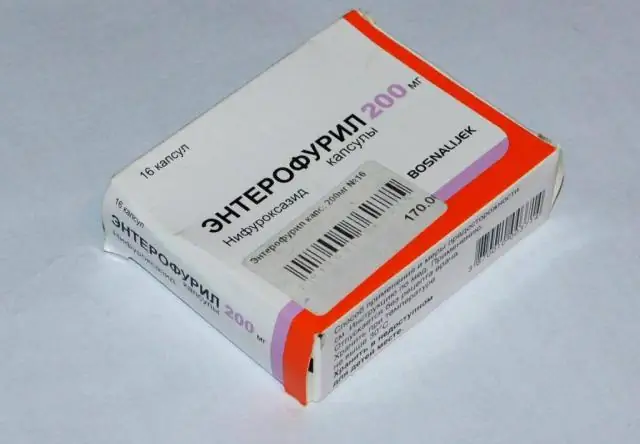- Author Rachel Wainwright [email protected].
- Public 2023-12-15 07:39.
- Last modified 2025-11-02 20:14.
Irunin
Irunin: instructions for use and reviews
- 1. Release form and composition
- 2. Pharmacodynamics and pharmacokinetics
- 3. Indications for use
- 4. Contraindications
- 5. Method of application and dosage
- 6. Side effects
- 7. Overdose
- 8. Special instructions
- 9. Application during pregnancy and lactation
- 10. Use in childhood
- 11. Application for violations of liver function
- 12. Application for impaired renal function
- 13. Drug interactions
- 14. Analogs
- 15. Terms and conditions of storage
- 16. Terms of dispensing from pharmacies
- 17. Reviews
- 18. Price in pharmacies
Latin name: Irunin
ATX code: J02AC02
Active ingredient: Itraconazole (Itraconazole)
Manufacturer: Veropharm (Russia)
Description and photo update: 2019-06-08
Prices in pharmacies: from 250 rubles.
Buy

Irunin is a broad-spectrum antifungal agent.
Release form and composition
Dosage forms:
- Capsules: size No. 0, hard gelatinous, yellow; the contents of the capsules are almost white or white spherical pellets (in blister strip packs: 6 or 10 pcs., 1 pack in a cardboard box, 7 pcs., 2 packs in a cardboard box);
- Vaginal tablets: almost white or white, in the form of a ring (10 pcs. In blisters, 1 pack in a cardboard box).
Irunin's active ingredient is itraconazole:
- 1 capsule - 100 mg;
- 1 vaginal tablet - 200 mg.
Auxiliary components:
- Capsules: copolymer of methacrylic acid (eudragit), hypromellose (hydroxypropyl methylcellulose), propyl parahydroxybenzoate (nipazole), sucrose (sugar), methyl parahydroxybenzoate (nipagin), sugar crumbs (starch syrup, sucrose (sugar));
- Vaginal tablets: potato starch, lactose (milk sugar), povidone (polyvinylpyrrolidone), sodium lauryl sulfate, magnesium stearate, talc.
Additionally, in the capsule composition: gelatin, titanium dioxide, iron oxide yellow, methyl parahydroxybenzoate (nipazole), methyl parahydroxybenzoate (nipagin), acetic acid, sunset yellow dye (E110), quinoline yellow dye (E104).
Pharmacodynamics and pharmacokinetics
Itraconazole is a triazole derivative that inhibits the synthesis of ergosterol in the cell membrane of fungi.
This substance is active against infections caused by the following microorganisms:
- dermatophytes (Epidermophyton floccosum, Microsporum spp., Trichophyton spp.);
- yeast and yeast-like fungi (Pityrosporum spp., Cryptococcus neoformans, Candida spp., including C. krusei, C. albicans and C. glabrata);
- Fonsecaea spp., Paracoccidioides brasiliensis, Aspergillus spp., Histoplasma spp., Blastomyces dermatitidis, Sporothrix schenckii, Cladosporium spp.;
- other molds and yeasts.
With oral administration of Irunin, the maximum bioavailability of the drug is noted immediately after a heavy meal. The maximum concentration in plasma is observed 3-4 hours after ingestion. The drug is excreted from plasma in two phases, the final half-life is from 1 to 1.5 days. With long-term use, it takes 1-2 weeks to reach equilibrium concentration. The equilibrium concentration of itraconazole in plasma 3-4 hours after taking Irunin is:
- when taking 100 mg 1 time per day - 0.4 μg / ml;
- when taking 200 mg once a day - 1.1 μg / ml;
- when taking 200 mg 2 times a day - 2 μg / ml.
Itraconazole is able to bind to plasma proteins by 99.8%.
The accumulation of Irunin in keratin tissues (especially in the skin) is approximately 4 times higher than the accumulation of the drug in the blood plasma, and the rate of its elimination is directly affected by the regeneration of the epidermis.
Plasma concentrations of itraconazole cannot be detected as early as 7 days after completion of treatment, however, therapeutic concentrations in the skin persist for 2-4 weeks after the end of a 4-week course of therapy. Itraconazole can be detected in nail keratin within 7 days after the start of treatment and within 6 months after the end of a course of therapy lasting 3 months. It is also found in sebum and sweat (to a lesser extent).
Irunin is well distributed in tissues susceptible to fungal infections. Concentrations in bones, muscles, stomach, liver, spleen, kidneys, and lungs were 2-3 times higher than the corresponding plasma concentrations. Therapeutic concentrations in the tissues of the vagina are determined within 2 days after the end of taking 200 mg of the drug per day, and also within 3 days after taking 200 mg 2 times a day during a one-day course of therapy.
Microbiologically determined antifungal drug concentrations are approximately 3 times higher than those measured by HPLC.
Irunin metabolism occurs in the liver and is accompanied by the formation of a large number of metabolites. One of these substances is hydroxy-itraconazole, the antifungal effect of which is comparable to that of itraconazole. Through the gastrointestinal tract, 3-18% of the dose is excreted, through the kidneys - less than 0.03%. Approximately 35% of the dose is excreted within 7 days in the urine in the form of metabolites.
Indications for use
Capsules
- Systemic candidiasis and aspergillosis, cryptococcosis (including cryptococcal meningitis), sporotrichosis, histoplasmosis, blastomycosis, paracoccidioidomycosis and other types of systemic mycoses;
- Dermatomycosis;
- Visceral candidiasis;
- Vulvovaginal candidiasis and other candidomycosis infections with lesions of the mucous membranes and skin;
- Onychomycosis caused by molds, dermatophytes and / or yeasts;
- Fungal keratitis;
- Pityriasis versicolor.
Vaginal pills
The indication for the use of vaginal tablets is vulvovaginal candidiasis, including a recurrent form.
Contraindications
- Breastfeeding period;
- Hypersensitivity to drug components.
During pregnancy, capsules are prescribed in exceptional cases, only if the intended benefits of treatment are much higher than the existing threat to the fetus.
With increased activity of liver enzymes, acute phase of liver disease, the use of capsules is not desirable, except in cases of justified risk, if the expected benefit of therapy prevails over the threat of liver damage.
Care must be taken when prescribing capsules to patients with chronic heart failure (including history), lesions of the heart valves, ischemic heart disease, renal failure, chronic obstructive pulmonary disease.
Due to the lack of sufficient clinical data on the use of capsules in pediatrics, it is recommended to prescribe the drug to children only if the potential benefit of taking Irunin outweighs the possible risk.
The use of vaginal tablets in the first trimester of pregnancy is contraindicated, in the second and third trimesters, use is possible only if the expected effect of therapy for a woman exceeds the potential risk to the fetus.
Instructions for use of Irunin: method and dosage
Capsules
The capsules are taken orally, swallowing whole, immediately after a meal.
The dose of the drug and the period of treatment is prescribed by the doctor based on clinical indications and concomitant pathologies.
Recommended dosage:
- Vulvovaginal candidiasis: 200 mg 2 times a day for 1 day or in the same dose 1 time a day for 3 days;
- Pityriasis versicolor: 200 mg 1 time per day for 7 days;
- Dermatomycosis of smooth skin: 200 mg 1 time per day, duration of treatment - 7 days or 100 mg 1 time per day - 15 days;
- Fungal keratitis: 200 mg once a day, the course of treatment is 21 days; with lesions of the hands and feet, additional capsules are required at a dose of 100 mg per day for 15 days;
- Oral candidiasis: 100 mg 1 time per day with a duration of 15 days;
- Candidiasis: 100-200 mg 1 time per day (with disseminated or invasive form - 200 mg 2 times a day) with a duration of 21 days to 7 months;
- Aspergillosis: 200 mg 1 time per day (with invasive or disseminated form - in the same dose 2 times a day), the course of treatment is from 60 days to 5 months;
- Cryptococcosis (without meningitis): 200 mg 1 time per day, course of administration from 60 days to 12 months;
- Cryptococcal meningitis: 200 mg 2 times a day, maintenance therapy - 200 mg 1 time a day, treatment duration from 60 days to 12 months;
- Chromomycosis: 100-200 mg 1 time per day for 6 months;
- Sporotrichosis: 100 mg once a day for 3 months;
- Histoplasmosis: 200 mg 1-2 times a day, the course of therapy is 8 months;
- Paracoccidioidomycosis: 100 mg 1 time per day for 6 months;
- Blastomycosis: 100-200 mg 1-2 times a day, treatment period - 6 months.
When capsules are prescribed to patients with transplanted organs, neutropenia, AIDS and other immunity disorders, the dose is increased by 2 times.
With onychomycosis, two types of therapy are possible:
- Continuous treatment for 3 months with the intake of 200 mg of Irunin 1 time per day;
- Taking the drug for 7 days, 200 mg 2 times a day, followed by a break of 21 days. With fungal infections of the nail plates of the hands, 2 courses are required, stop - 3 courses.
The optimal mycological and clinical effect of therapy occurs after discontinuation of the drug after 14-30 days for skin infections and 6-9 months for nail infections.
Vaginal pills
Irunin vaginal tablets are used intravaginally, inserted into the vagina in a supine position with legs bent at the knees. The procedure is performed in the evening before bedtime.
Dosage regimen: 1 tablet 1 time per day for 7-14 days.
A repeated course is possible after agreement with the attending physician.
Side effects
Capsules
- Nervous system: possibly - fatigue, headache, peripheral neuropathy, dizziness;
- Digestive system: often - nausea, dyspepsia, constipation, abdominal pain; possibly - anorexia, increased activity of liver enzymes (reversible), hepatitis, cholestatic jaundice; in some cases - toxic liver damage, including a case of acute liver failure with a fatal outcome;
- Reproductive system: possibly - violation of the menstrual cycle;
- Cardiovascular system: possibly - pulmonary edema, chronic heart failure;
- Urinary system: hypercreatininemia, dark urine staining;
- Metabolism: hyperkalemia, edema;
- Dermatological reactions: possibly - alopecia;
- Allergic reactions: possibly - itchy skin, rash, angioedema, urticaria, Stevens-Johnson syndrome.
Vaginal pills
When using vaginal tablets, local reactions can rarely occur: a burning sensation in the vagina, itching, skin rash in the external genital area (drug withdrawal is not required).
Overdose
In case of an overdose of capsules, it is possible to develop effects comparable to dose-dependent adverse events when using the usual doses of the drug. There is no specific antidote, therefore, in case of an overdose, it is necessary to rinse the stomach with a soda solution within 1 hour and start taking enterosorbents. Itraconazole is not excreted during hemodialysis.
Exceeding the recommended dosage when using vaginal tablets usually does not cause hazardous reactions to health. In case of accidental oral administration of tablets, it is necessary to rinse the stomach and start taking enterosorbents.
special instructions
The appointment of capsules to patients with chronic heart failure is indicated in exceptional cases, since Irunin has a negative inotropic effect.
Patients with low acidity of the stomach who are on simultaneous therapy with antacids are recommended to take them 2 hours after taking the capsules. It is necessary to drink cola capsules when combined with proton pump inhibitors or histamine H 2 receptor blockers, for patients with achlorhydria.
You should use reliable methods of contraception for women of childbearing age during the period of taking the capsules until the onset of the first menstrual bleeding after completion of therapy.
The drug should be used with caution in patients with liver diseases or those on therapy with drugs that have a hepatotoxic effect. Their treatment is recommended to be accompanied by regular monitoring of liver function and close medical supervision. If symptoms of hepatitis develop (weakness, abdominal pain, dark urine, nausea, vomiting, anorexia), itraconazole should be discontinued immediately and liver function tests should be performed. In case of liver disease in the active phase or an increased level of liver enzymes, it is advisable not to prescribe Irunin.
If signs of neuropathy appear, further use of the capsules should be discontinued.
Itraconazole should be used with caution if there is a history of azoles hypersensitivity.
To avoid reinfection, the use of vaginal tablets in a woman must be carried out while treating the sexual partner and observing the rules of hygiene.
Sexual intercourse is contraindicated during the period of treatment with vaginal tablets.
If there is no clinical effect and there are signs of infection after completion of therapy, a repeated microbiological examination is required to confirm the diagnosis.
With the development of an allergic reaction, the administration of tablets should be discontinued; if necessary, immediate removal of the drug, you can rinse the vagina with boiled water.
The effect of the drug does not affect the patient's ability to drive vehicles and mechanisms.
Application during pregnancy and lactation
In the course of experimental studies it was found that itraconazole has an embryotoxic effect and can cause fetal abnormalities.
During pregnancy, it is permissible to use Irunin only for systemic mycoses and only in situations where the benefits to the mother outweigh the risks to the child.
During treatment with the drug, women of childbearing age should use reliable contraceptives.
When Irunin is prescribed during lactation, breastfeeding should be interrupted.
Pediatric use
There is no sufficient data on the use of the drug in the treatment of children.
Application for violations of liver function
According to the instructions, Irunin should not be prescribed to patients with liver diseases, however, in case of emergency in case of liver cirrhosis, the drug is used under the control of its plasma content and with a corresponding dose adjustment.
With increased activity of liver transaminases, Irunin is used only in cases where the potential benefit outweighs the potential risk of liver damage.
When taking itraconazole for more than 1 month, it is necessary to monitor liver function.
If symptoms of liver dysfunction develop, treatment with itraconazole is discontinued.
Application for impaired renal function
In case of emergency, the drug is used under the control of its plasma content and with an appropriate dose adjustment.
Drug interactions
Itraconazole should not be prescribed in combination with drugs metabolized by the isoenzyme CYP3A4, terfenadine, mizolastine, astemizole, cisapride, midazolam (oral), triazolam, dofetilide, pimozide, quinidine, HMG-Coastinate reductase inhibitors, can cause proliferation of HMG-Coastinate reductase inhibitors, enhancement of their action and side effects. The level of itraconazole in blood plasma after withdrawal decreases gradually, depending on the duration of treatment and the dose.
The combination of itraconazole with calcium channel blockers leads to an increase in its negative inotropic effect and a decrease in the metabolism of calcium channel blockers.
The effectiveness of the capsules decreases against the background of the simultaneous administration of rifabutin, rifampicin, phenytoin, which are strong inducers of microsomal liver enzymes and significantly reduce the bioavailability of itraconazole. A similar effect can be assumed when combined with phenobarbital, carbamazepine, isoniazid and other hepatic enzyme inducers.
The bioavailability of the drug may increase when combined with ritonavir, indinavir, erythromycin, clarithromycin and other inhibitors of the CYP3A4 isoenzyme of the cytochrome P 450 system.
With the simultaneous use of HIV protease inhibitors (indinavir, ritonavir, saquinavir), oral anticoagulants, some antineoplastic drugs (busulfan, pink vinca alkaloids, trimetrexate, docetaxel), some immunosuppressants (tacrolimus, cyclosporin, CYP3 metabolizers, sirolimus inhibitors) channels (verapamil, dihydropyridine), carbamazepine, digoxin, buspirone, alprazolam, alfentanil, brotizolam, methylprednisolone, rifabutin, reboxetine, ebastine, regular monitoring of their concentration in blood plasma is required. If necessary, their combination with itraconazole, the dose of these drugs should be reduced.
No interaction was found with fluvastatin and zidovudine, no effect of capsules on the metabolism of norethisterone and ethinyl estradiol was noted.
Studies have confirmed the lack of interaction of Irunin with propranolol, imipramine, diazepam, indomethacin, cimetidine, sulfamethazine, tolbutamide, when binding to plasma proteins.
The drug interaction of itraconazole in the form of vaginal tablets when used in combination with other drugs has not been established.
Analogs
Irunin's analogues are: Itrazol, Itraconazole, Itramikol, Canditral, Orungal, Orungamin, Rumikoz, Teknazol, Zalain, Vagisept, Fluconazole, Livarol, Mikosist, Nizoral, Clotrimazole.
Terms and conditions of storage
Store in a dark, dry place at temperatures up to 25 ° C. Keep out of the reach of children.
Shelf life is 2 years.
Terms of dispensing from pharmacies
Dispensed by prescription.
Reviews about Irunin
Reviews about Irunin allow us to conclude that it is highly effective in the treatment of nail fungus and thrush. At the same time, it must be remembered that the drug can cause serious side effects, therefore, it must be taken only under medical supervision.
Price for Irunin in pharmacies
The price for Irunin is:
- 6 capsules 100 mg - from 362 to 462 rubles;
- 10 capsules 100 mg - from 590 to 690 rubles;
- 14 capsules 100 mg - from 650 to 860 rubles;
- 10 vaginal tablets 200 mg - from 280 to 315 rubles.
Irunin: prices in online pharmacies
|
Drug name Price Pharmacy |
|
Irunin 200 mg vaginal tablets 10 pcs. RUB 250 Buy |
|
Irunin pills vaginal. 200mg 10 pcs. 390 RUB Buy |
|
Irunin 100 mg capsules 6 pcs. 396 r Buy |
|
Irunin capsules 100mg 6 pcs. RUB 471 Buy |
|
Irunin 100 mg capsules 10 pcs. 653 r Buy |
|
Irunin 100 mg capsules 14 pcs. 735 RUB Buy |
|
Irunin capsules 100mg 14 pcs. 841 RUB Buy |

Maria Kulkes Medical journalist About the author
Education: First Moscow State Medical University named after I. M. Sechenov, specialty "General Medicine".
Information about the drug is generalized, provided for informational purposes only and does not replace the official instructions. Self-medication is hazardous to health!






